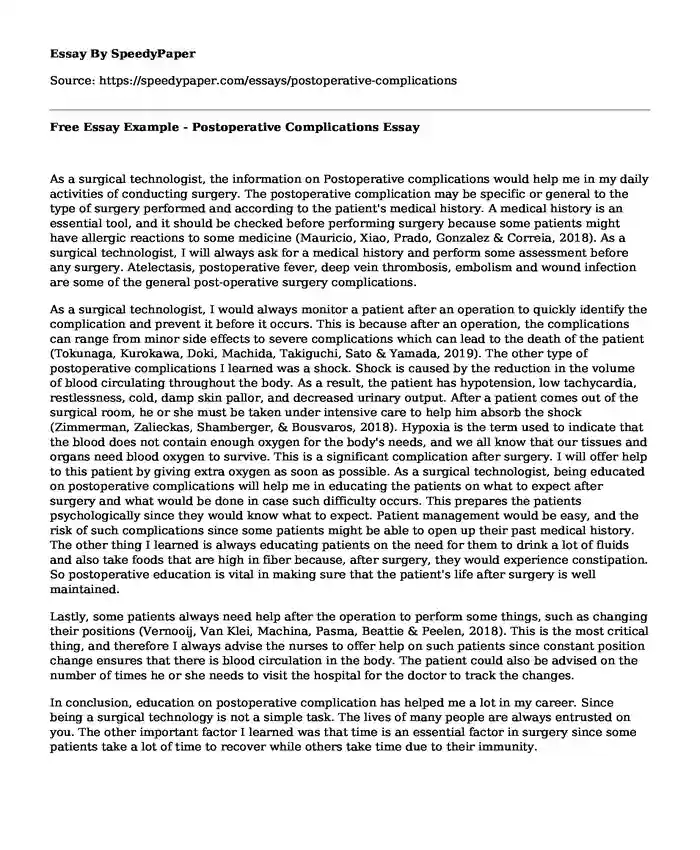As a surgical technologist, the information on Postoperative complications would help me in my daily activities of conducting surgery. The postoperative complication may be specific or general to the type of surgery performed and according to the patient's medical history. A medical history is an essential tool, and it should be checked before performing surgery because some patients might have allergic reactions to some medicine (Mauricio, Xiao, Prado, Gonzalez & Correia, 2018). As a surgical technologist, I will always ask for a medical history and perform some assessment before any surgery. Atelectasis, postoperative fever, deep vein thrombosis, embolism and wound infection are some of the general post-operative surgery complications.
As a surgical technologist, I would always monitor a patient after an operation to quickly identify the complication and prevent it before it occurs. This is because after an operation, the complications can range from minor side effects to severe complications which can lead to the death of the patient (Tokunaga, Kurokawa, Doki, Machida, Takiguchi, Sato & Yamada, 2019). The other type of postoperative complications I learned was a shock. Shock is caused by the reduction in the volume of blood circulating throughout the body. As a result, the patient has hypotension, low tachycardia, restlessness, cold, damp skin pallor, and decreased urinary output. After a patient comes out of the surgical room, he or she must be taken under intensive care to help him absorb the shock (Zimmerman, Zalieckas, Shamberger, & Bousvaros, 2018). Hypoxia is the term used to indicate that the blood does not contain enough oxygen for the body's needs, and we all know that our tissues and organs need blood oxygen to survive. This is a significant complication after surgery. I will offer help to this patient by giving extra oxygen as soon as possible. As a surgical technologist, being educated on postoperative complications will help me in educating the patients on what to expect after surgery and what would be done in case such difficulty occurs. This prepares the patients psychologically since they would know what to expect. Patient management would be easy, and the risk of such complications since some patients might be able to open up their past medical history. The other thing I learned is always educating patients on the need for them to drink a lot of fluids and also take foods that are high in fiber because, after surgery, they would experience constipation. So postoperative education is vital in making sure that the patient's life after surgery is well maintained.
Lastly, some patients always need help after the operation to perform some things, such as changing their positions (Vernooij, Van Klei, Machina, Pasma, Beattie & Peelen, 2018). This is the most critical thing, and therefore I always advise the nurses to offer help on such patients since constant position change ensures that there is blood circulation in the body. The patient could also be advised on the number of times he or she needs to visit the hospital for the doctor to track the changes.
In conclusion, education on postoperative complication has helped me a lot in my career. Since being a surgical technology is not a simple task. The lives of many people are always entrusted on you. The other important factor I learned was that time is an essential factor in surgery since some patients take a lot of time to recover while others take time due to their immunity.
References
Mauricio, S. F., Xiao, J., Prado, C. M., Gonzalez, M. C., & Correia, M. I. T. D. (2018). Different nutritional assessment tools as predictors of postoperative complications in patients undergoing colorectal cancer resection. Clinical Nutrition, 37(5), 1505-1511.https://www.sciencedirect.com/science/article/pii/S0261561417303096
Tokunaga, M., Kurokawa, Y., Doki, Y., Machida, R., Takiguchi, S., Sato, Y., ... & Yamada, T. (2019). The impact of postoperative complications on survival outcomes in patients with cT3/4a gastric cancer. https://ascopubs.org/doi/abs/10.1200/JCO.2019.37.15_suppl.4067
Vernooij, L. M., Van Klei, W. A., Machina, M., Pasma, W., Beattie, W. S., & Peelen, L. M. (2018). Different methods of modeling intraoperative hypotension and their association with postoperative complications in patients undergoing non-cardiac surgery. British journal of anesthesia, 120(5), 1080-1089. https://www.sciencedirect.com/science/article/pii/S0007091218301004
Zimmerman, L. A., Zalieckas, J. M., Shamberger, R. C., & Bousvaros, A. (2018). Postoperative complications of pediatric patients with inflammatory bowel disease treated with vedolizumab. Journal of pediatric surgery, 53(7), 1330-1333. https://doi.org/10.1016/j.jpedsurg.2017.12.001
Cite this page
Free Essay Example - Postoperative Complications. (2023, Feb 13). Retrieved from https://speedypaper.com/essays/postoperative-complications
Request Removal
If you are the original author of this essay and no longer wish to have it published on the SpeedyPaper website, please click below to request its removal:
- Research Paper Example on the Advantages of Semi-structured Interviews
- Essay Sample about Importance of Sports for Teenagers
- Essay Example on Darwin's View on the Origin of Religion
- Aspiration Statement. Essay Example.
- Free Essay Example on The Voting Rights Act
- Paper Example on Interspecies Organ Donation
- Essay Sample on Teamwork and Collaboration for Patients With Diabetes
Popular categories





